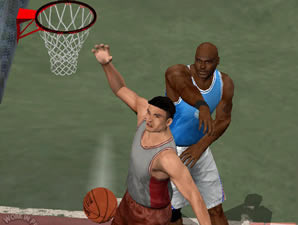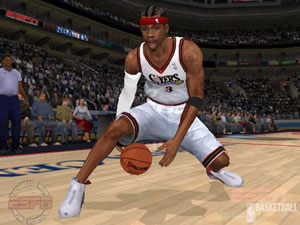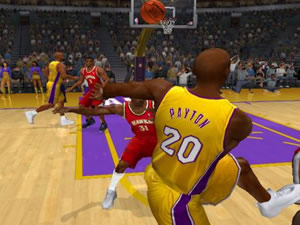Protecting the rock.
After four years as the undisputed king of the video game court, Visual Concepts’
2K basketball series finally got some real competition in last
year’s NBA Live 2003. The old standby got its
act together with revamped graphics and innovative control, a long-awaited upgrade
that continued in this year’s solid NBA Live 2004.
So how would 2K respond? Would it shy away from change and
stick with what it knows best – namely, outstanding graphics and hardcore simulation
gameplay – or take the hint and rework its somewhat limited control?
Like
any good ballplayer, the new ESPN NBA Basketball has accepted
the challenge and matches Live shot for shot, in many ways
shaking EA’s series out of its shoes with a cool new mode and much better graphics.
But several niggling flaws keep this contender from holding on to the crown,
resulting in the first tie-game in NBA history.
It’s not a tie when it comes to the look, however. ESPN NBA Basketball
outshines the competition with some of the best graphics in any sports game
to date. The ESPN branding is everywhere, resulting in pretty menus and a slick
front end. Out on the court, expect the best facial-modeling ever. Every player
on every team, not just the superstars, look amazingly lifelike. You’ll know
at a glance who every guy is without having to see their jersey. In fact, this
is the first game I’m aware of that actually nails down some specific free-throw
shooting styles like Karl Malone’s bounce and twirl or Jason Kidd’s kiss to
the basket.
Like last year’s NBA 2K3, players glisten with
sweat as the game progresses. The courts are accurate, the framerate blazes
and the animations are really cool. Both systems perform well, though the Xbox
is cleaner than the PS2. If looks alone determined success, this would be no
contest.
But Sam
Cassell will quickly point out that looks don’t count for much; thankfully,
ESPN Basketball has the gameplay to back it up…almost.
In response to EA’s lauded Freestyle mode, ESPN offers IsoMotion,
which essentially works the same way: you move the right analog stick to pull
off a series of juke moves. The animations look great, but the moves are canned
and can take a while to complete. You press right hoping to give a quick crossover,
but instead sit back and watch your guy dribble between his legs, around his
back and spin towards the basket. It’s just too much and makes it hard to string
together moves. IsoMotion also often results in a charge, especially at the
higher difficulty settings, so you wind up not using it much in real games.
However, IsoMotion moves do have defensive stoppers, turning man on man defense
into a sort of timing and guessing game. Get it right and you’ll steal the ball;
get it wrong and you might catch the back of your opponent’s head as he flies
past you to the hoop. It’s a cool idea that adds tension.
For the most part, ESPN is a slower game than NBA
Live, focusing more on half-court execution than fast breaking. Some
new pass types such as fake passes and the handy lead pass are welcome. However,
someone forgot to include real playbooks, instead only allowing you four offensive
plays that are identical to every team. It’s lame, especially since you kind
of need those to free up your men from the often tight defense.
Rebounding is also an issue. Unless you micromanage your big men, you’ll watch
in horror as they routinely fail to box out even the smallest guards. You can
solve that by doing the dirty work yourself, but that can be more of a chore
than anything else.
At least you can fix this and other flaws by tweaking just about every option
possible, but the change between Pro and All-Star difficulties is huge, so don’t
bite off more than you can chew.
Lucky for us there’s more to chew on than just the typical game. Several modes
of play are here, including typical Season, Exhibition, Street and Practice
modes along with a bigger Franchise mode and the innovative 24/7 mode.
Franchise here beats NBA Live‘s in terms of depth, easy.
Not only can you play GM by signing, trading and managing salary caps, but you
can even hire and fire coaches, trainers, and scouts. They all have an affect
on your team – a better trainer results in fewer injuries and quicker healing,
while a better scout will give up more info on prospects. You can also control
multiple teams simultaneously, though anyone with that kind of time should probably
get off the couch and go to the gym every once in a while. At any rate, Franchise
is handled very well and should satisfy basketball nerds.
 In
In
the past, b-ball gamers would spend most of their time in Franchise, but ESPN‘s
new 24/7 mode will definitely change that. It’s sort of a cross between Animal
Crossing, Seaman and a sports
game, if you can believe it, and it’s pretty sweet.
You start by creating a character, then you set about watching your little weed of a newbie grow into a hulking forest of a player. You do this by upping your rating through playing in a variety of matches against NBA players, often one on one, or by bulking out your attributes in Training sessions. As you win matches, you gain items to make your guy look cooler.
The trick is that the mode works with your system clock. The available match
types change by the hour and your player’s stats will deteriorate over time
if you don’t play with him. It’s like a basketball Tamagotchi who never poops.
It’s also pretty addictive, and you might well find yourself putzing around
here instead of trying to win the title in the other modes.
There are some problems, though. The items you unlock don’t change your stats
or anything, which is a shame because it could have added some great depth.
Plus, the separate Training sessions are the only way to increase your stats;
you just gain ‘rating’ points (which unlock higher level match types) in the
normal matches. It would have been much better if you gained stats by playing,
period, as it’s irritating that you can only upgrade your 3-point shot by sinking
shots in one game, while in another the 10 you made in a row count for zip.
And that 3-pointer comes in really, really handy. You can basically dominate
any player so long as you can sink the three-ball because the A.I. isn’t half
as good here as in the five-on-five modes. Players bite constantly on pump fakes.
I shut out the 99-rated Clyde Drexler with my weak scrub in a ‘Historic’ match
type just by faking and draining shots.
But in the long run, 24/7 mode is a good addition that gives you much more
bang for the buck. You’ll flip back and forth between your Franchise and 24/7
often, leading to a more varied game than anything else on the market.
I wish the sound had as much variety. Tom Tolbert and Kevin Frasier call the shots, and while I love Tolbert in real-life, he’s gratingly repetitive in the game. The effects are decent, mostly just squeaky sneakers, and the hop-hop soundtrack is fine if that’s your bag.
And as always, playing with a friend is a great way to solve the AI dilemmas. Both versions are online as well, one-upping EA’s PS2 online-only obsession.
With its excellent graphics and myriad game modes, ESPN NBA Basketball
is a good, strong title. The gameplay quirks like rebounding difficulty and
the canned animations are there and can be frustrating, but are easily overlooked
when you take in the big picture. It holds its own in the paint.

-
Awesome graphics
-
Good Franchise mode
-
Addictive 24/7 mode
-
Both versions online
-
Rebounding is rough
-
Isomotion not as good as Freestyle
-
24/7 still needs work











